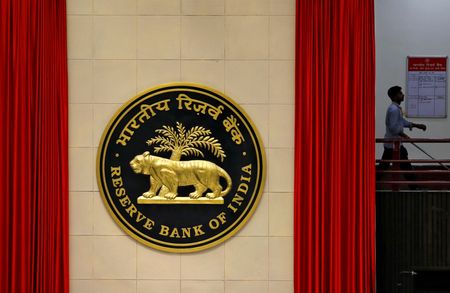By Dharamraj Dhutia
MUMBAI (Reuters) – The Reserve Bank of India’s move to inject longer-term liquidity through a tool it had left untouched for three years is likely to be used more often as the banking system is poised to move from surplus towards a more consistent deficit, analysts said.
The central bank will conduct a 14-day variable rate repo auction later on Friday–its first since February 2020–to infuse 500 billion rupees ($6.06 billion) into the banking system.
The daily average surplus of 180 billion rupees in the last three weeks is sharply lower than the 860 billion rupees in the first three weeks of 2022.
More recently, liquidity has been oscillating between a surplus (of over 650 billion rupees on Monday) and a marginal deficit (of 112 billion rupees on Wednesday) amid a strong pick-up in bank credit and higher government spending.
“Gradually, the liquidity deficit is likely to widen,” said Deepak Agrawal, chief investment officer – debt at Kotak Mahindra Mutual Fund.
“An increase in currency in circulation and a build-up of government cash balances with the central bank towards the fiscal year-end will be factors that add to the deficit over the next few weeks,” he said.
The tightening liquidity boosted the overnight inter-bank call money rates to as high as 6.80% on Thursday, to above the marginal standing facility rate of 6.75%.
The RBI’s objective is to maintain the overnight inter-bank rate close to the policy rate–currently at 6.50%–and prevent it from overshooting the MSF rate, which acts as the upper end of the interest rate corridor.
“The 14-day variable rate repo announced by the RBI shows that we could see a longer period of liquidity deficit in the coming months,” said Guara Sen Gupta, India economist at IDFC First Bank.
The liquidity may tighten further as outflows worth nearly 750 billion rupees are due over the next couple of months for maturing long-term repos conducted at the start of the pandemic.
“…the activation of the 14-day variable rate repo auction appears to be the right strategy to prepare market participants for the incoming gradual squeeze on liquidity surplus,” said Vivek Kumar, an economist at QuantEco Research.
OVERNIGHT LIQUIDITY
Market participants also cautioned that the 14-day repo conducted in isolation could lead to volatility in the short-term call and TREPS market.
“Unless the central bank supplements the 14-day auction with a shorter-term overnight repo, we may see some volatility continuing in overnight rates, if all banks are not willing to borrow for 14 days,” Kotak Mahindra Mutual Fund’s Agarwal said.
Moreover, traders say some banks may not unwilling to borrow for longer durations at an elevated rate and may still prefer overnight money.
“The 14-day repo could be supplemented by short-dated VRR auctions on a need basis to tide over liquidity demand caused by short-term frictional factors,” QuantEco Research’s Kumar said.
($1 = 82.6220 Indian rupees)
(Reporting by Dharamraj Dhutia; Editing by Savio D’Souza)








